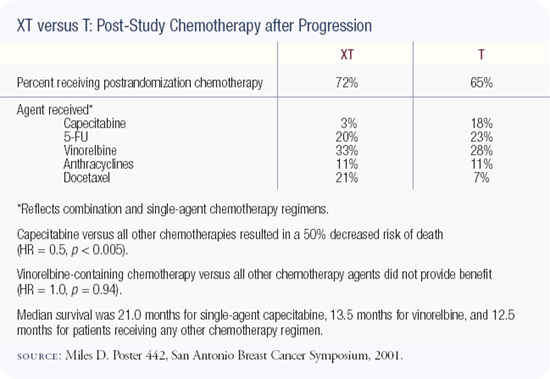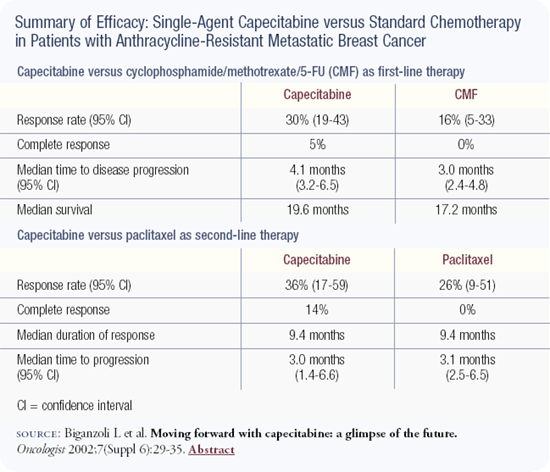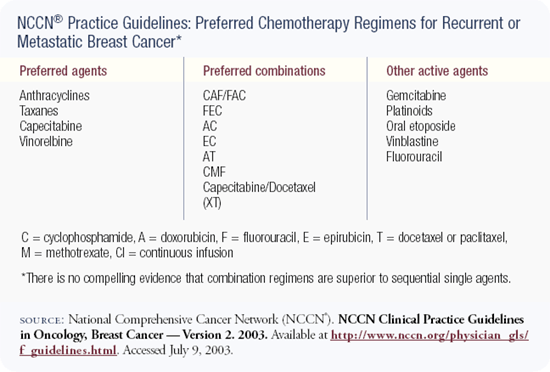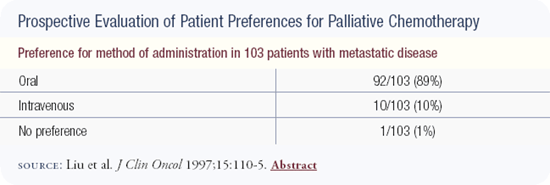You are here: Home: Special Report: 21st Annual Miami Breast Cancer Conference 2004:
J: Chemotherapy in Metastatic Breast Cancer






| RESEARCH LEADER COMMENTARY |
 |
Sequencing chemotherapy in the metastatic setting
In terms of sequencing chemotherapy in the metastatic setting, I generally start with an anthracycline in patients who did not receive one in the adjuvant setting. Otherwise, I usually begin with a taxane. Capecitabine is my next chemotherapy choice after anthracyclines and taxanes.
Especially in elderly or frail patients, I always bring capecitabine into the equation. Not only is it oral, but it is also associated with a good quality of life if the dose is somewhat attenuated and we monitor for hand-foot syndrome.
I usually start capecitabine as a single agent at 2,000 mg/m2 per day in two divided doses for three to five cycles and then a rest. I do not routinely use it with docetaxel, though I recognize that a number of people do and there are good reasons to do so in certain conditions.
— Richard M Elledge, MD
Dr O'Shaughnessy's study of women with metastatic breast cancer demonstrated that the combination of capecitabine/docetaxel — compared to docetaxel alone — resulted in improved response rate, time to progression and survival. The dosing and scheduling of the combination are controversial and remain to be defined. In the XT trial, the drugs were given simultaneously on day one. It's possible that upregulating TP with a taxane should be done before introducing capecitabine, and perhaps lower doses will result in the same benefit. If you want to utilize aggressive therapy, the combination in the XT trial was superior and the quality of life wasn't impaired compared to the sequential approach.
— Vincente Valero, MD
Sequential single-agent versus combination chemotherapy in patients metastatic breast cancer
The big question associated with the sequential single-agent versus combination chemotherapy trials is the effect of crossover therapy. In Joyce O'Shaughnessy's trial, we don't know what the effect on survival would have been if 60 or 70 percent of the patients treated with single-agent docetaxel were then treated with capecitabine. Maybe there would not have been a survival difference. Hence, the effect of crossover therapy remains a question in all of these trials comparing doublets to single-agent regimens.
— Stephen E Jones, MD
Capecitabine/docetaxel in the metastatic and adjuvant settings
When Dr Joyce O'Shaughnessy presented the positive data from the capecitabine/ docetaxel trial in the metastatic setting, I was surprised by the results. Many of us thought there would be no significant difference. We had compared doxorubicin with and without vinorelbine and didn't see a significant difference, so we expected to see the same results with this study. The data is exciting and I think it warrants examination in the adjuvant setting. If we can treat these patients for three to six months and have them be well for five or 10 years, that's worth studying.
— Kathleen I Pritchard, MD
I use the capecitabine/docetaxel regimen for a select group of women with metastatic disease those with more extensive disease and with a better performance status. The regimen produces good results but may have significant toxicity, especially at the doses that were initially presented. I tend to start at 1,250 mg/m2 twice a day for 14 days followed by seven days off as the regular approach. If you select your patient population appropriately, it's tolerable. The hand-foot syndrome is manageable with appropriate dose reductions when it occurs. The hardest symptom complex I encounter with that regimen is the GI toxicity. It's more difficult to manage and less amenable to improvement with dose reductions.
— Generosa Grana, MD
I am a big fan of capecitabine. Maybe it comes from being a "hormonal-therapy person" preferring pills to begin with, because I use it a lot for salvage chemotherapy in women who've already had an anthracycline and a taxane for metastatic disease. In oncology, we tend to remember our successes, but I have seen several very impressive responses with capecitabine in pretty dire circumstances. I have had women on it for a considerable period of time with relatively good quality of life. My personal best was somebody who was on capecitabine for several years.
— Nancy Davidson, MD
Select publications
|
